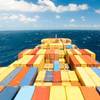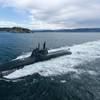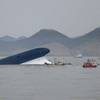A decade-long project to promote implementation of an international treaty stemming the transfer of potentially invasive species in ships’ ballast water has reached a successful conclusion at a meeting of stakeholders from Governments, industry and UN bodies.
The International Maritime Organization (IMO) has been executing the GloBallast Partnerships Program in collaboration with the Global Environment Facility (GEF) and the United Nations Development Programme (UNDP).
The project was launched in 2007 after an initial 4-year phase and has been assisting developing countries to reduce the transfer of harmful aquatic organisms and pathogens in ships’ ballast water and implement the IMO Ballast Water Management (BWM) Convention.
The final meeting of the GloBallast Global Project Task Force (GPTF), held in Panama City, Panama (16 to 17 March), highlighted the legacy elements of the GloBallast project, which are expected to be sustained by its main stakeholders following the formal closure of the project in June 2017.
Specific examples include GloBallast training packages to support the capacity-building needs of countries implementing the BWM Convention. The regular Ballast Water Management R&D Fora, which promoted development of innovative ballast water treatment technologies, are also expected to continue after the project’s closure.
The GloBallast project has developed a successful model of working with lead partnering countries as well as the shipping industry and academia to catalyse knowledge-sharing, training and capacity-building.
Regional task forces were formed in 12 developing sub-regions and regional strategies and action plans on ballast water management were developed, involving more than 100 countries; to date, six of these action plans have been adopted through the regional cooperating institutions.
GloBallast has also facilitated capacity building at the national level, helping to establish national task forces and assisting with drafting and adopting the national legislation in 80% of its lead partnering countries. This has supported many of these countries to ratify the BWM Convention, which will enter into force in September 2017. The meeting in Panama promoted the key role of the project’s lead partnering countries within their respective regions to sustain regional BWM implementation, and explored funding mechanisms that could finance future capacity-building needs.
The GloBallast project also pioneered a public-private sector partnership. The Global Industry Alliance for Marine Biosecurity (GIA) includes shipping companies such as Keppel Offshore and Marine (KOM) and APL. This alliance supported the formation of the Global Ballast Water Test Organizations Network (GloBal TestNet), which is formed of 19 organizations that test ballast water treatment systems and aims to increase levels of standardization, transparency and openness in so doing.
Dr Stefan Micallef, Director of IMO’s Marine Environment Division, said the GloBallast project was an outstanding example of direct, large-scale action taken by IMO, together with other international entities, to address the global threat to the health of the world’s oceans from invasive species carried in ships’ ballast water.
“Through GloBallast, Governments, industry and other stakeholders have acted to further improve the environmental and socio-economic sustainability of shipping and worked to reduce its negative impact on marine ecosystems. I have every hope that the ‘GloBallast family’ will continue its championing efforts and collaboration to protect our oceans, in the spirit of the United Nations Sustainable Development Goal 14,” Dr Micallef said.
Dr Andrew Hudson, Head of the Water & Ocean Governance Programme at UNDP, said the GloBallast project had pioneered a successful model for collaboration, cooperation and capacity-building, which was now being emulated through other “Glo-X” projects.
“The GEF-UNDP-IMO GloBallast Programme has played a key catalytic role in preparing countries and the shipping industry for the implementation of the BWM Convention, which will reduce the significant ecological and economic damage, lost livelihoods and human health impacts often caused by invasive species. The legacy and impacts of the project will go on long after it formally closes,” Dr Hudson said.
Mr Chris Severin, International Waters Coordinator at the GEF, said the GEF is proud to have partnered with the United Nations, through IMO and UNDP, towards providing the world with a framework to start tackling one of the avenues - namely the BWM Convention - for spreading of invasive species.
“I sincerely believe that the implementation of the BWM Convention will assist nations not only in delivering essential contributions to the Sustainable Development Goals, but also offer an opportunity for unlocking the potential of the so-called blue economy. The two GEF projects, totalling a grant of $12 million USD, have been supporting the 17-year process leading to what we are celebrating today, namely the entry into force of the BWM Convention – a convention that, through strong partnerships with leading nations and private sector partners, will unlock an unprecedented estimated private-sector investment of a minimum of US$30 billion,” Mr Severin said.











